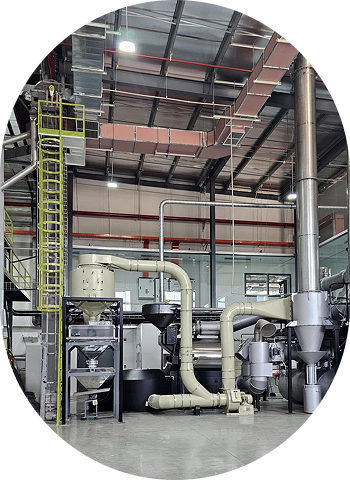Introduction
The art of coffee roasting is as much about science as it is about passion. A shop coffee roaster plays a vital role in turning raw green beans into aromatic, flavorful coffee that captivates customers. Whether you’re a small café, specialty roastery, or a coffee educator, investing in the right roaster ensures consistency, precision, and quality. A shop roaster bridges the gap between small experimental roasting and large-scale commercial roasting, making it the perfect solution for businesses aiming to elevate their craft.
Why Shop Coffee Roasters Matter for Specialty Coffee
In the specialty coffee industry, every detail counts. The freshness of the beans, the roast profile, and even the consistency of each batch influence customer experience. A shop coffee roaster provides the control and flexibility needed to experiment with roast levels, create signature blends, and achieve repeatable quality. Unlike industrial-scale roasters, shop roasters focus on batch precision, allowing small businesses to test, refine, and deliver consistent results to their customers.
The Evolution of Shop Coffee Roasters
Coffee roasting has come a long way from open-pan roasting methods to today’s precision-engineered shop roasters. Modern roasters combine traditional drum roasting techniques with advanced controls, enabling precise management of airflow, drum speed, and temperature. Over time, the shop coffee roaster has evolved into an indispensable tool for artisans and small businesses looking to compete with larger coffee brands without compromising on quality.
Key Features to Look for in a Shop Coffee Roaster
Choosing the right machine requires careful consideration. Some features that define a high-performing shop roaster include:
Batch Capacity: Typically ranging between 1kg to 5kg, depending on your business scale.
Temperature Control: Precision temperature sensors allow roasters to manage every stage of the roast.
Airflow Adjustments: Helps control heat transfer and flavor development.
User Interface: Digital displays and automated systems make monitoring roast progress easier.
Durability: Built with high-quality materials to withstand continuous use.
These features ensure that each roast delivers consistent results, helping businesses maintain quality and reliability.
The Role of Shop Coffee Roasters in Coffee Education
Coffee schools, training centers, and workshops rely heavily on shop coffee roasters to train baristas and roasters. These machines provide real-time learning opportunities where students can experiment with roast curves, understand bean development, and see how small changes impact flavor. A shop roaster serves as the bridge between theory and practice in coffee education.
Shop Coffee Roaster for Small Cafés and Micro-Roasteries
For small businesses, a shop roaster is both an investment and a branding tool. It allows cafés and micro-roasteries to create signature coffee profiles that differentiate them from competitors. Customers increasingly value transparency and authenticity, and roasting in-house demonstrates a commitment to freshness and quality. A shop roaster enables businesses to move away from generic wholesale coffee and towards unique offerings that strengthen customer loyalty.
Common Challenges When Using a Shop Coffee Roaster
While shop roasters are powerful tools, they come with challenges. New roasters often struggle with:
Inconsistent Profiles: Without proper training, maintaining consistency can be difficult.
Maintenance Needs: Regular cleaning and part replacement are crucial for longevity.
Underestimating Capacity: Businesses often outgrow small roasters faster than expected.
Learning Curve: Mastering roast curves requires practice and attention to detail.
Overcoming these challenges requires a combination of training, experience, and proper equipment management.
Coffee Trends Driving Shop Roaster Demand
With the rise of specialty coffee culture, shop roasters are more in demand than ever. Trends such as direct trade, micro-lot coffee, and sustainable sourcing require roasters to highlight the unique characteristics of beans. A shop coffee roaster makes it possible to showcase these distinct flavors with precision. Additionally, consumer demand for transparency encourages businesses to roast on-site, building trust and engagement with customers.
Comparing Shop Roasters with Larger Commercial Roasters
While commercial roasters excel in high-volume production, shop coffee roasters specialize in precision and flexibility. Larger roasters often prioritize efficiency over experimentation, while shop roasters allow small businesses to focus on quality. For start-ups or growing cafés, a shop roaster is often the smarter choice, offering room for creativity without the overwhelming investment of industrial-scale equipment.

Maintenance and Care for Shop Coffee Roasters
To maximize performance, proper care is essential. Regular cleaning of chaff collectors, exhaust systems, and cooling trays prevents blockages and flavor contamination. Replacing worn-out parts and monitoring drum rotation ensures even roasting. Just like coffee itself, a roaster performs best when maintained with consistency and care.
Business Location
At 21st Floor, CMA Building, 64 Connaught Road Central, Hong Kong, businesses can explore professional roasting solutions that combine tradition with modern technology. Here, coffee professionals and enthusiasts have access to the latest shop roasters, lab equipment, and training support, ensuring every roast delivers unmatched quality.
Sustainability in Shop Coffee Roasting
Modern consumers value sustainability as much as flavor. Many shop coffee roasters are designed with energy-efficient systems that reduce emissions and minimize waste. Businesses adopting eco-friendly roasting not only appeal to conscious consumers but also contribute positively to the environment. Sustainable roasting practices include energy recovery systems, recyclable packaging, and direct sourcing of green coffee.
How Shop Coffee Roasters Empower Innovation
Innovation in coffee roasting often starts with small batches. Shop roasters provide roasters the flexibility to experiment with origins, blends, and roast profiles. This agility allows businesses to create limited-edition batches, collaborate with local producers, and constantly refresh their offerings. Innovation builds brand identity, and a shop coffee roaster is at the heart of this process.
Why the Right Shop Coffee Roaster Defines Success
The success of a coffee business depends on consistency, flavor, and customer satisfaction. Investing in the right roaster ensures that businesses can meet customer expectations with every cup. With the right shop coffee roaster, businesses not only achieve operational efficiency but also strengthen their brand reputation in a competitive industry.
Conclusion:
A shop coffee roaster is more than a machine it’s the foundation of specialty coffee excellence. It empowers businesses to control quality, express creativity, and engage customers with transparency. From small cafés to training centers, the role of shop roasters continues to grow in importance. For any business looking to elevate its coffee experience, investing in the right roaster is not just a choice but a necessity.
FAQs
1. What is a shop coffee roaster?
A shop coffee roaster is a medium-sized roasting machine designed for cafés, micro-roasteries, and training centers. Unlike large commercial roasters, it focuses on precision, allowing small businesses to roast in smaller batches while maintaining consistency and quality. Shop roasters typically range from 1kg to 5kg in capacity, making them ideal for small to medium-scale coffee production.
2. Who should invest in a shop coffee roaster?
Shop coffee roasters are best suited for specialty cafés, small roasteries, coffee educators, and entrepreneurs who want to create their own blends. They’re also perfect for businesses aiming to showcase transparency by roasting on-site, giving customers a unique coffee experience.
3. How does a shop coffee roaster differ from a commercial roaster?
While both machines serve the same purpose turning green beans into roasted coffee—the main difference lies in capacity and flexibility. A commercial roaster is designed for high-volume production, while a shop coffee roaster is optimized for precision, experimentation, and small-batch roasting. This makes shop roasters more versatile for businesses that prioritize flavor development over mass output.
4. What size of shop coffee roaster should I choose?
The ideal size depends on your business needs. For small cafés or coffee shops producing limited batches, a 1kg or 2kg roaster is sufficient. Growing businesses or micro-roasteries may prefer 3kg to 5kg shop roasters to balance demand with flexibility. Choosing the right size ensures efficiency while allowing room for future growth.
5. How do I maintain a shop coffee roaster?
Proper maintenance is crucial for performance and longevity. Routine care includes cleaning the chaff collector, cooling tray, and exhaust system, as well as checking the drum rotation and airflow. Regular servicing and part replacements also help prevent breakdowns, ensuring consistent roasting quality over time.













